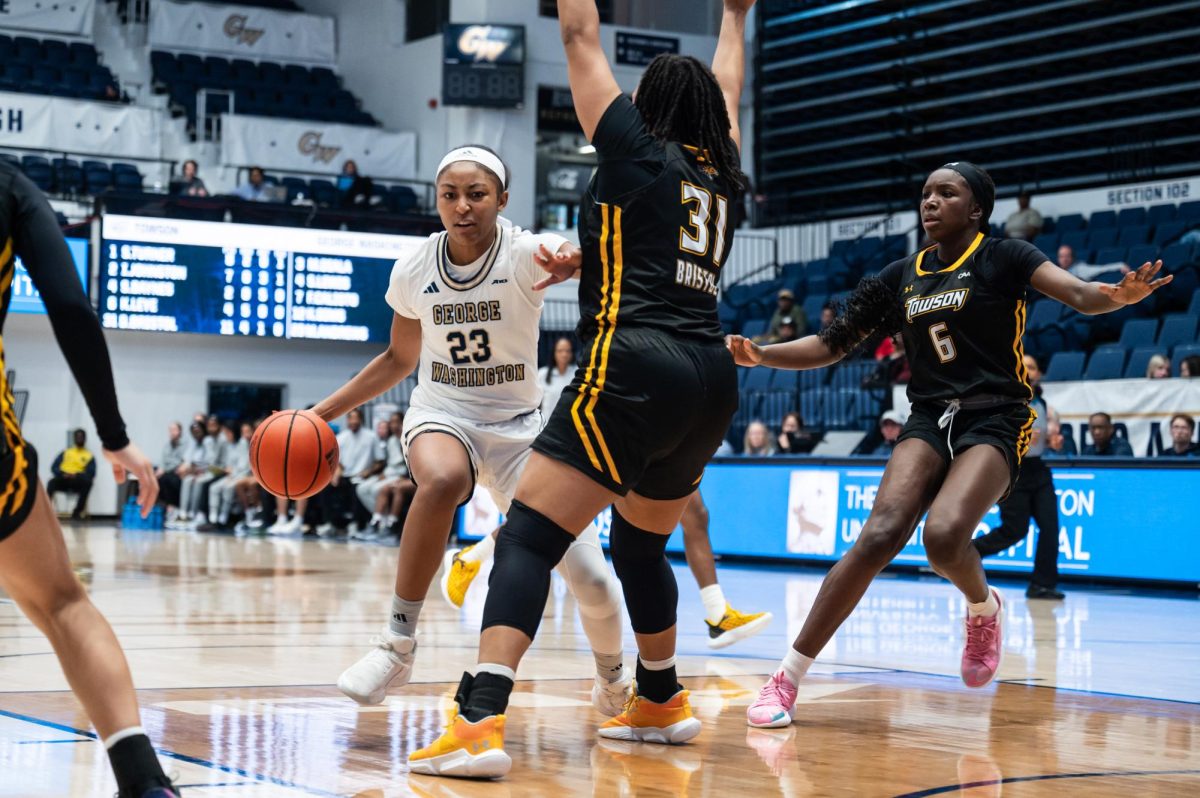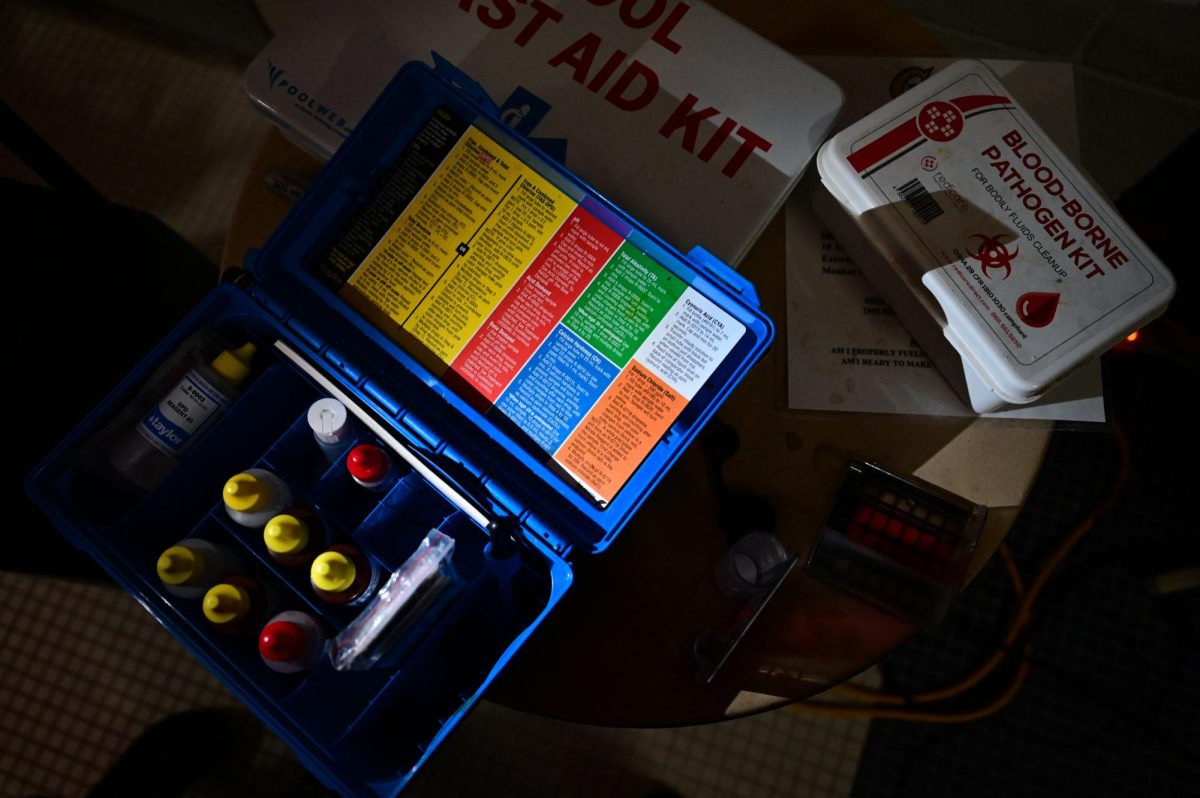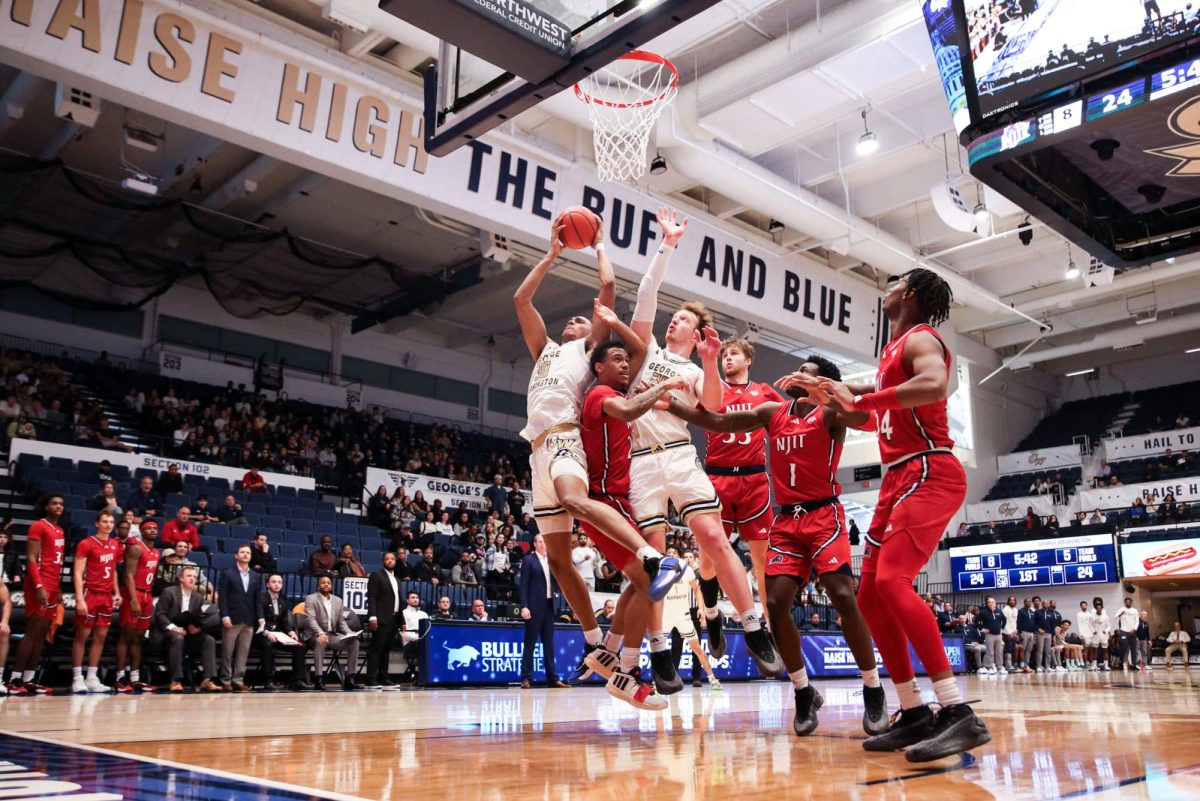You had to feel for Duquesne coach Danny Nee on Saturday. The man came into the Smith Center in the midst of what is now a 6-19 season, and his team was listless. If the Dukes really believed they could win at GW, it was sure hard to tell. It looked more like they had braced themselves for a rough afternoon and were just looking to escape without suffering too much.
Even Nee, who was up on the sidelines shouting out instructions for much of the first half, spent most of the second half sitting on the bench with a blank, bewildered look on his face.
That face aptly captured the feeling the Colonials leave other teams with when they are clicking, as they have been for the past five games. It’s a much more helpless feeling than teams would get two years ago, when the story with GW was about an individual. Chris Monroe captivated fans that year with his pursuit of GW’s all-time scoring record, which he eventually broke, and helped an overwhelmingly young Colonial team win some ballgames by putting up 20 points a night.
Defenders could focus primarily on one player then. Today, coaches don’t even know where to start. Take Saturday, for example. T.J. Thompson and Pops Mensah-Bonsu score a combined 20 points in the first half, putting GW up by 10 at the break. But those two don’t play much in the second half, so what happens? In comes Omar Williams, and J.R. Pinnock, and Maureece Rice, and so on. Eleven players end up scoring, four in double figures, and here’s the kicker – no one scores more than 15.
According to their 17-5 record, the Colonials are the second best squad in University history right now. But with their depth, balance and seemingly interchangeable parts, this may well be the best team the school has ever seen. Whether they are among the most successful remains to be seen, but their brand of team basketball is fascinating to watch and, when working, difficult to defend.
Of the top 15 scoring teams in Division I basketball going into Saturday (GW’s 80 points per game ranked 13th), only two did not have a single player averaging 15 points or more: GW and Texas. Coach Karl Hobbs’ team is probably the best in the Atlantic 10, and yet he has no Jameer Nelson or David West for NBA scouts to drool over. Mensah-Bonsu is the closest thing GW has to a marquee player, yet seldom-heralded Mike Hall is just as important in the frontcourt. Thompson is the senior leader, but his team can win whether he scores 27, as he did against Maryland, or nine, as he did recently against Richmond.
The Colonials also play defense as a unit, setting up in their full-court press like the Patriots going into their nickel defense, or swarming the ball with a half-court trap. All of this pressure, take-a-gamble-and-make-the-other-team-react defense only works with five guys executing seamlessly. No one player makes it happen, save for perhaps Mensah-Bonsu blocking shots and Carl Elliott leading the A-10 in steals, and one player out of position can cause the whole thing to collapse.
But there is one great caveat to this brand of team ball: the team can be collectively unstoppable or wholly ineffective, sometimes both in the same game. If their opponent is playing a zone, for example, and Thompson isn’t shooting well from the outside, all of the sudden it seems like no one can hit a shot. Then teams are able to clamp down on Mensah-Bonsu and GW’s forwards, and it becomes cyclical. Good play, both offensively and defensively, breeds more good play, and bad play seems to breed more bad play.
Basketball is a game of momentum and runs – that’s not unique to GW. But many NCAA Tournament-caliber teams have at least one guy that can bail the rest of the team out when it’s down, a guy everyone feeds off of. Even Hobbs has said there is no imminent NBA talent on the Colonials right now – the players feed off each other. So for GW, it’s their way or no way at all. It’s their style of play – fast-paced offense, pressure defense and everyone but the mascot scoring points – or a slow-down game better suited for their opponents that no one player can break them out of.
For a stretch in late January, it was the latter, and GW no longer looked like the Top 25 team that beat Maryland and Michigan State. Hobbs says some of the expectations that came with the ranking affected his team’s psyche. At the very least, a month of seeing zone defense affected its productivity.
But going into this week’s critical games at Xavier and Dayton in Ohio, a state GW has not won a regular season game in since 1998-99, the Colonials appear to be right where they want to be. They don’t have much room for error, but if their offensive machine keeps running the way it has lately, just ask Danny Nee how teams will try to slow them down.
“Strategy? (Heck), did you see the final score?” he said during Saturday’s press conference in response to one reporter’s question. He then got up to leave the room, muttering on his way out, “We couldn’t do anything with them.”






